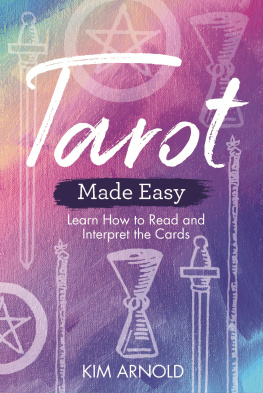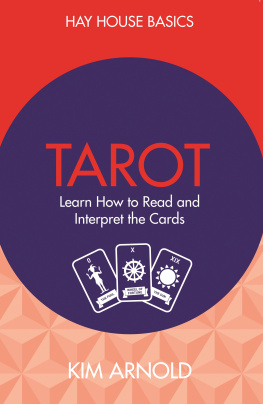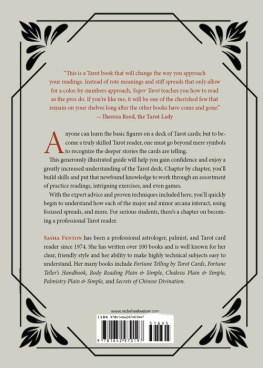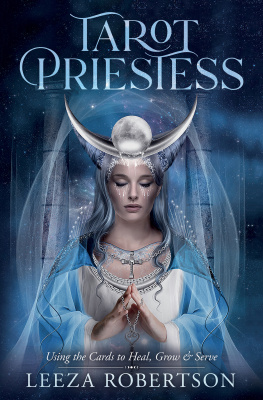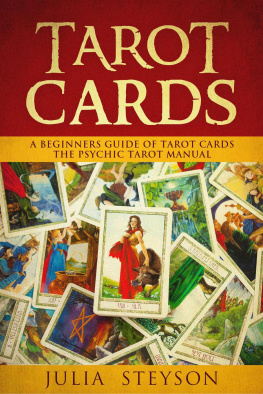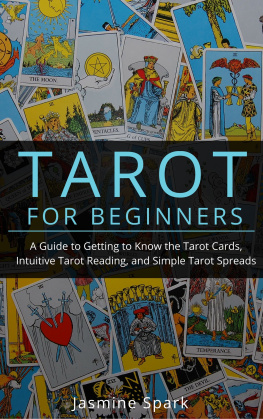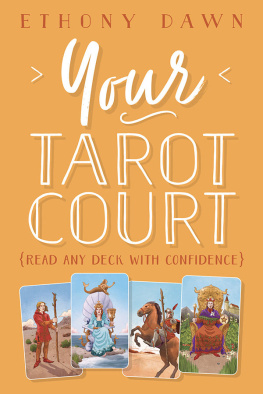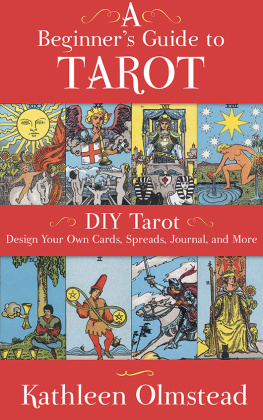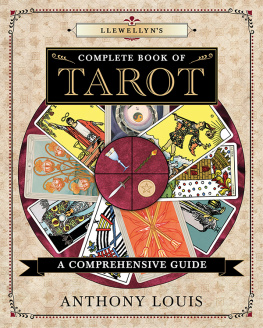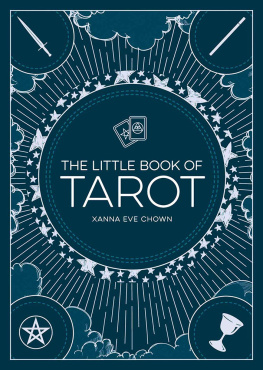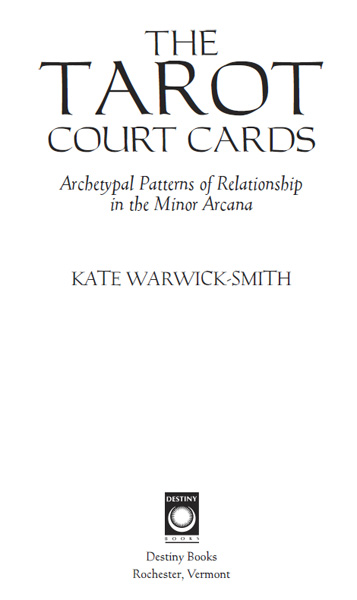
For Simon
Acknowledgments
I n the lengthy process of writing this book, I have benefited from the contributions of many people. I would like to acknowledge Susan Bassett, Kimberly Bess, Batja Cates, Dennis Daniels (in memory), Robin Fife, Gay Kisby, Arisha Wenneson, deTraci Regula, and Lindsay Whiting for their enthusiasm and feedback during the beginning stages of this project. For later editorial help and insight, thanks are due to Timothy Campbell, Stephen Grafenstine, Karen Misuraca, and Joanie Springer. As I hunted down various bits and pieces of needed information, I benefited from the gracious and magnanimous assistance of Krys Bottrill, Peter Cawley, Michael Cooper, Ina Custers, Laura Lazzelle, John McLeod, and Simon Wintle. I am indebted to Michael Bess for his translation help with Le Tarot Divinatoire and Chrysalis Counseling Services for Women for providing a quiet writing sanctuary when I needed it most.
I owe thanks, meals, and much, much more to understanding family and valued friends: Shelley T. Daniels, Elise Dwyer, Barrie Elrod, Kerianne Hohener, Julie McGee, and Tubby Smith. I would also like to extend my sincere thanks to Dolores Ashcroft-Nowicki, Chris Corey, Roberta Goldfarb, and Devin Ryder, who each provided key support along the way. In addition, I could not have done this without the inspiring influence of my students and clients and the stalwart encouragement of Ned Atchison.
Finally, my love and profound gratitude go to Simon, Bo, and Shona Warwick-Smith.
Tables
Introduction
T his book reveals a new way to interpret the sixteen court cards of the Tarot deck, a method that offers valuable insight into our personal relationships.
The core idea presented in the following pages is that the face cards of the Tarot depict people in our lives who support us in unique ways. Traditionally the kings, queens, knights, and pages of the Tarot deck are defined as the interpersonal aspect, the people cards, representing people around us or personality traits within us. Modern court card interpretations, though, are often idiosyncratic, confusing, and difficult to apply in a practical way. However, when the court cards are viewed through the lens of this book, they can clearly and accurately reveal the nature of a support-based relationship between the querent (the person asking the question of the Tarot) and someone in the querents life.
The evidence that court cards point to our supporters can be gleaned from some of the earliest references to European card playing, where the game is called the Game of Deputies. The word deputies refers to the court cards, and a deputy is defined as an assistant, a representative appointed to carry out a specific job. The phrase a game of deputies gives us our first clue as to the significance of these cards on a divinatory level. It hints that court cards may represent people who, while maybe not consciously elected allies, are clearly part of our support team. The Game of Deputies aptly and colorfully reflects the theme of this book.
From Native American traditions that hold spirit ally relation-ships as all-important, to the New Age Michael teachings that refer to support circles, spiritual traditions old and new speak of support as an important aspect of personal growth and good health. The early rival to Christianity, Gnosticism, propounds the call from without, indicating a spiritually important supportive relationship. In addition, the Chinese I Ching consistently points to various types of relationships and frequently advises that the querent seek his or her family of support. And just outside the realm of spirituality, modern psychotherapeutic practice looks closely at a persons support network.
Ten years ago, in the wake of studying a number of these spiritual traditions and puzzling over how to interpret court cards while giving Tarot readings, a light bulb went on for me. I realized that the Tarot might be one more tradition that embodies the perennial concept of support. At that time I jotted down a few notes. Several years later I put pen to paper to flesh out those ideas and to see if using the theoretical basis of the Qabalah could help describe archetypal patterns of relationship that these other spiritual traditions suggest. I discovered that the inherent structure and symbolism of the court cards, whether by design or accident, implied a set of congruent ideas centered around supportive relationships. This discovery gave birth to a method of court card interpretation that was both insightful and accurate.
During the initial writing process, I showed the manuscript to a few people, yet for a good number of years it sat incubating. Mean-while I trained in the field of counseling psychology. Then, in an odd twist of fate, the manuscript found its way to a publisher.
As I began final revisions, it seemed that my clients were describing their relationships as if they had read my manuscript. They spoke of their disappointment in not receiving support while growing up, such as the Unconditional Love (King of Cups), Trust (Knight of Pentacles), or Compassion (Queen of Cups) of a parent. Instead they experienced the Abuser (Queen of Pentacles), Betrayer (King of Cups), Victim (Queen of Cups), or Critic (Queen of Swords). They also described important supportive relationships that were empowering and life changing, such as Protector (Knight of Pentacles), Champion (Knight of Swords), Adviser (King of Swords), or Spiritual Elder (King of Wands).
The court cards had made their way into my counseling office. Or perhaps they had always been there and I was just beginning to spot them. It did not take long for me to realize that every relationship we have can be described in terms of support. Whether positive, negative, long-term, or short-term, every relationship is some form of support. This is a big statement to make. But taken alongside the teachings of Eastern spiritual leaders and Western environmentalists that all planetary life is interconnected, support can be seen as the thread in the web of connection.
Some may ask, but how can a negative relationship be defined as support? Support has many facets. People help us in positive ways (supporters) or challenge us by providing obstacles to be overcome or lessons to be learned in the form of difficult or negative relationships (detractors). And sometimes we pay for support, such as with a consultant, tutor, babysitter, personal trainer, or therapist. Unfortunately we live in a society where asking for or receiving support is often seen as weakness or lack of ability. One goal of this book is to open up the world of support to reveal exactly who sup-ports us, how they support us, and how we can bring more of that into our lives. This knowledge can be life changing.
A second goal of this book is to demonstrate how the court cards can reflect our inner life. People in our external world can mirror an inner process. In psychological jargon this is called projection, where we notice characteristics in someone else that in truth belong to us. We are unaware of these aspects of ourselves and see them instead in another person. We can usually tell that projection is happening when we react strongly to a person. So it follows that the court cards, as well as representing people in our lives, can reflect our own personality characteristics, inner figures, or subpersonalities that enhance (resource) or hinder (challenge) our efforts in the world. This book provides tools for examining those parts of ourselves.
For those who are interested in the divinatory aspect of the court cards, The Tarot Court Cards lays out simple and useful methods of interpretation. In addition, for students of the Western Mysteries, meditation techniques and pathworkings for exploring these cards are included.
Next page

